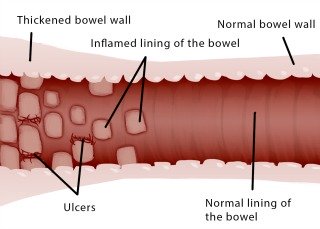- Home
- Crohn's
Crohns Disease Life Expectancy Symptoms and Diet
Crohns disease is a chronic illness marked by bowel obstruction, bloody diarrhea, cramps, abdominal pain, stomach pain, ulcers, vomiting, nausea, weight loss, frequent bowel movements, inflammation of colon, malabsorption, joint pain, fever, extreme anxiety, and depression. These symptoms mimic another disease called ulcerative colitis and the two are often misdiagnosed.

Common Misspellings: chrones disease, crohn disease, croans disease, chrons, crones
Burrill B. Crohn was one of the first doctors to research the cause of the disease. In 1932, he published a paper describing the condition as “Terminal Ileitis”. Dr. Crohn also worked with Jesse Shapiro, M.D., a doctor diagnosed with the disease who devotedly worked on finding a cure.
From a personal perspective, I witnessed a very close family member with the disease on a daily basis. Crohn's disease caused anxiety not only for my family member but for myself as well. As a young child it was hard to watch someone who was once healthy and active become so sick and bleeding profusely throughout the day. Eating foods like nuts and corn were always a cause of concern as were many other foods.
At its peak, Crohn's disease affected every part of her life. Even going on family vacations were stressful because a sudden flare-up made trips to the bathroom a necessity no matter where we were. I remember wishing I could take her pain away but of course I couldn't. Not even the doctors who prescribed a cocktail of medications could. The severity of the condition just became worse and worse until one day the bleeding wouldn't stop and she was in immediate need of hospitalization.
The solution for the problem was surgery. At that time there was no talk of alternative medicine or other natural remedy. She was told her life expectancy would be cut short and would have lost too much blood had she not opted for the surgery. If she had known another way to stop the pain and progression of the disease maybe she would have chosen a different path but that was not a choice she was given. Through all the debilitating Crohn's disease symptoms I'm proud to say she survived through it, lives a full life, and still refuses to let this condition get the best of her.
Important Facts about Crohns Disease
Some patients will have severe symptoms which make them very ill while others have more mild symptoms
- Early on patients are given drugs such as corticosteroids to help with inflammation
- Crohns usually affects the lowest portion of the small intestine
The immune system, which defends the body against harmful substances and disease, attacks the gastrointestinal system, which starts at the mouth and ends at the anus
Smokers have a greater risk of developing the disease
Intestinal sores or ulcers that break into the surrounding tissue are called fistulas
Children with Crohns are shorter than their counterparts and suffer from delayed development
Doctors do not know the cause of the disease
There is no known cure for the disease
There are different types of Crohns disease depending on the location affected
Crohns is a form of inflammatory bowel disease (IBD)
Symptoms may disappear for long periods of time but can become active again
Crohn's disease is considered an autoimmune disease (the immune system attacks it's own healthy cells thinking they are foreign)
Women who take oral contraceptives have an increased risk of Crohns
Both men and women are affected equally and the disease tends to run in families
Crohns causes inflammation, swelling, and ulcers in the intestines
The intestinal wall can become so thick and narrow that contents can not pass through causing life threatening events in need of hospitalization
Your daily diet and stress may aggravate symptoms making them worse
Crohns can be diagnosed at any age from a 3 month old baby to an 85 year old but the onset usually occurs between the age of 15-30
Crohn's disease is associated with eating a diet high in carbohydrates
Many people with Crohns disease are histamine-intolerant and foods such as fish, pickled cabbage, hard sausage, milk and cheese cause problems
When medications can no longer control symptoms, surgery is performed to remove the diseased intestine
People with Crohns disease are nutritionally deficient
People with Crohns disease have a higher risk of developing colon cancer
The Jewish population has a much higher incidence of Crohns than the general population
- Crohns disease or ulcertive colitis may be one of the accutane side effects, a strong medication for acne
How to Diagnose Crohn's Disease
In order to get a correct diagnosis for the disease a doctor can run a series of tests. Since the disease can affect anywhere from the mouth to anus it can be difficult to tell the difference between Crohns and other conditions like ulcerative colitis.
A blood test can be done to check for high white blood cell count. A doctor can perform a colonoscopy to look at the inside of the large intestine. The doctor will need to look at the small intestines by doing an upper gastrointestinal X-ray. More X-ray tests involve looking at both the upper and lower digestive tract to see the extent of the inflammation.
Nutrients and Herbs to Relieve Symptoms
If you're interested in natural remedies, a doctor that specializes in gastrointestinal health may be able to recommend a naturopathic physician (also called homeopathy). They specialize in alternative medicine and minimal use of surgery.
It could also be helpful to seek the advice of a Nutritional Counselor. They can determine your food allergies and sensitivities by elimination diets. Then, they will design a specific food program so you can get the vitamins and nutrients you need.
Some herbs that seem to be beneficial in relieving symptoms and reducing inflammation include drinking ½ cup of aloe vera juice 3 times a day. Pau d' arco is a tea that can be found in health food stores. Rose hips, which is also good for high blood pressure, and milk thistle extract are also helpful.
L-glutamine is a nutrient that provides fuel for intestinal cells while Duodenal glandular helps heal ulcers. Pancreatin plus bromelain assist in digestion. Vitamin D3 is important for a vast number of reasons to maintain health. These are just some of the essential nutrients needed to reduce symptoms and achieve remission. For more information see the colitis diet page.
Related Pages
Return from Crohns Disease to Candida Counsel

Popular Articles